Complaints from business organizations, indicate that, British companies are experiencing costly shipping and delays of up to four weeks due to the actions of the Houthi group in the Red Sea.
The British Chambers of Commerce (BCC) found that more than 1/3 of the businesses they asked have been impacted.
That number went up to over 50% for exporters who took the survey.
The extra costs could make things more expensive for everyone in the UK, the BCC said.
William Bain, who is in charge of trade policy for the BCC, said that the shipping-freight industry has extra space to deal with the problems, which has given us more time.
However, when talking to the media said: “The stress is increasing and there is only a limited amount of time that we can handle the expenses. ” The amount that prices are going up is not as bad as during the pandemic, but prices will still go up.
Exporters, stores, middlemen, and makers were the most affected, according to the BCC. This left some with not enough products to sell or make things, and they also had money problems.
The BCC said that shipping around the bottom of Africa at the Cape of Good Hope was making deliveries take three to four weeks longer. Some companies said they had to pay over 300% more for renting shipping containers.
Rachael Waring, who runs Warings Furniture, said that the conflict has been hurting her business since before Christmas. Her company brings in furniture for pubs and restaurants.
“We needed to plan for more money because the prices for containers have been a lot higher than we expected,” she told BBC’s Wake Up To Money.
She is giving customers extra services to make up for being late. However, she wants to try to reduce the higher costs by bargaining for lower prices with the Chinese factories she gets her products from. She also wants to prevent raising prices for customers if possible.
The BCC, which stands for the British Chambers of Commerce and represents over 50,000 businesses, wants the government to provide more help to companies that export goods. They are asking for the creation of a council to promote trade.
Mr Bain said that the UK sold less stuff to other countries in 2023 and because the world doesn’t want to buy as much, the government needs to help out in the March Budget.
He said that it would be harder for small businesses like Rachael’s compared to bigger companies. He suggested that the government could make changes to business taxes to help small businesses during tough times.
The cost of shipping has gone up because Houthis attacked commercial ships in the Red Sea during the Israel-Hamas conflict in October. The group supported by Iran said it was attacking ships connected to Israel, the US, and the UK to help Hamas.
The US and the UK bombed Houthi targets in Yemen.
The Red Sea is the quickest way to travel by sea between Asia and Europe. Big shipping companies like Mediterranean Shipping Company and Maersk are sending their ships on a longer route around Africa’s Cape of Good Hope and then up the west side of the continent. However, it has caused prices to increase, including for insurance, and has also led to delays.
Earlier this month, one of the most well-known tea brands in the UK, Tetley, said that their supplies were low, and another tea company, Yorkshire Tea, is keeping a close eye on the situation.
The BCC listened to over 1,000 businesses in their yearly survey. It happened from January 15th to February 9th.
90 out of every 100 companies that replied were small businesses with less than 250 workers.
Tag: Red Sea
-
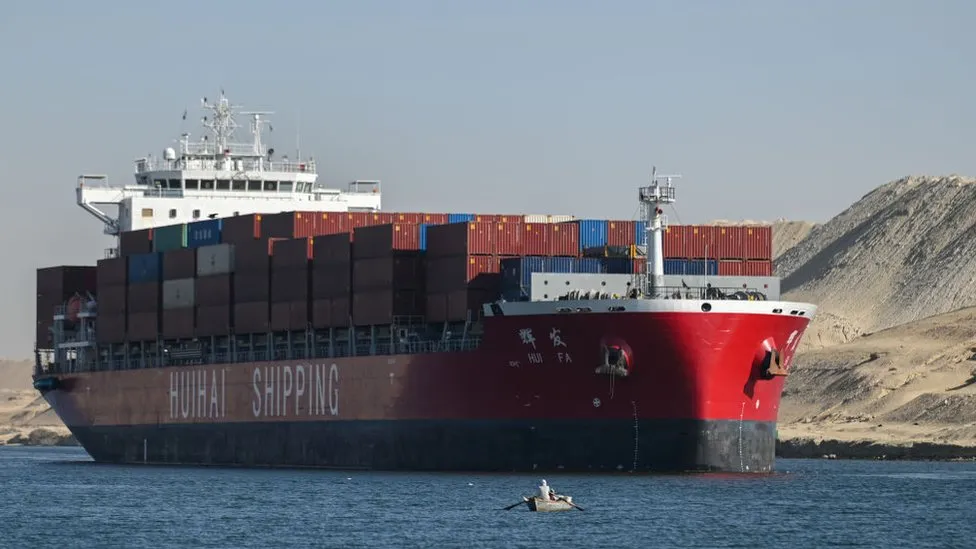
Red Sea raids increase expenses, delay shipments – companies
-
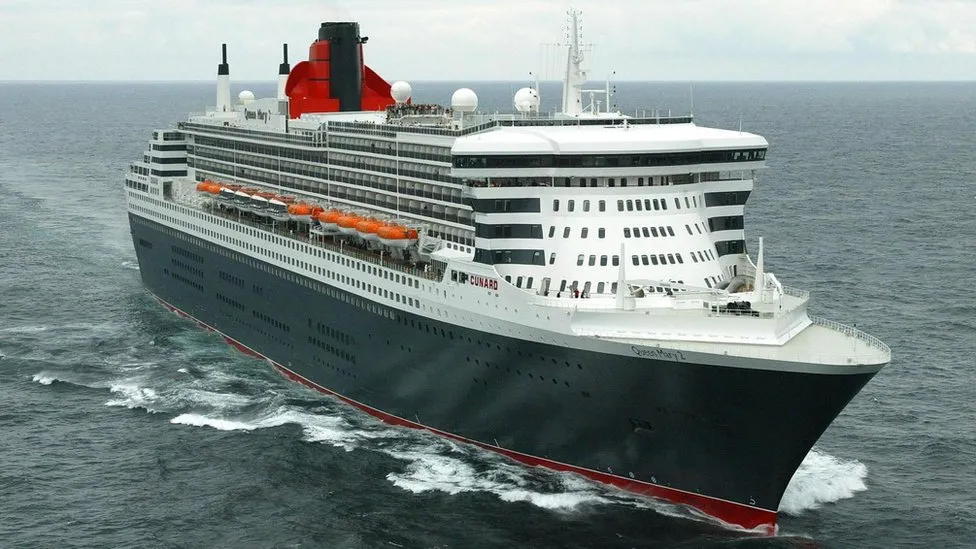
Cruise ships left Red Sea after attacks by Houthis
Cruise ships can’t go to the Red Sea because of the fighting in Yemen.
Carnival Corporation changed the course of 12 of its ships to go to a different area.
The ships are Cunard’s Queen Mary 2 and P&O Cruises’ Arcadia. They were supposed to go back to Southampton through the Suez Canal and Mediterranean.
Both ships will take an additional seven to 10 days to travel around the southern tip of Africa and then head home through the Atlantic.
Passengers will spend more time on the boat and less time visiting places they wanted to see, which they already paid for.
People who only booked the last part of the world cruises have had their trips cancelled.
Queen Mary 2 carries over 2,500 passengers, and Arcadia carries a little less.
A Cunard representative said the company is focused on keeping its guests and crew safe and healthy.
The person speaking said, “After considering recent events and talking to security experts and government officials, we have decided to change our route. ”
The Houthi rebels from Iran have been attacking ships in the Red Sea because they are angry about the Israel-Gaza conflict.
They haven’t attacked cruise ships yet, but they have been attacking navy ships and cargo ships.
Ships from Southampton usually go to sunny places during the winter and come back in March or April for the summer season in Europe.
Carnival Corporation, the biggest cruise company in the world, said it will have to spend more money on fuel because of changes to the cruise routes. -
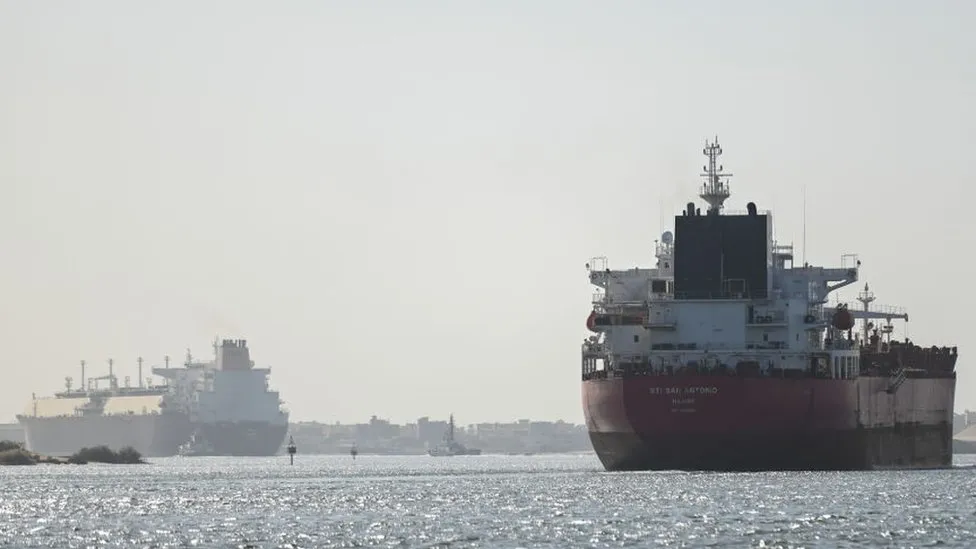
Houthis allege more assaults on ships in Red Sea
The Houthi group in Yemen has launched missiles at two ships in the Red Sea, even though the US and UK have attacked them.
Abdul Malik al-Houthi, the leader of the group, said that if the war between Israel and Hamas in Gaza doesn’t stop, his group will make the situation worse.
The Houthis attacked the Star Nasia and Morning Tide ships.
The ship called Star Nasia from Greece got hurt, but all the crew are okay, said a Greek official to Reuters.
Furadino Shipping Ltd, the British owner of the Morning Tide, said that there was a big bang near the ship, but the ship was okay, no one got hurt, and it kept going on its journey.
The group attacked after the US and UK did air strikes recently. The US hit two explosive surface vehicles on Monday.
The US said they hit Houthi missiles in previous attacks over the weekend. More than 30 places were hit in the third wave of UK and US attacks on Saturday.
The UK maritime agency received reports of a ship being attacked in the Red Sea near Hodeidah, Yemen, just after midnight.
British maritime security company Ambrey reported that a cargo ship owned by a British company and sailing under a Barbados flag was attacked and damaged while sailing at sea.
The leader of a UK warship called HMS Diamond, which has been helping to protect merchant ships from Houthi attacks in the Red Sea, said on Tuesday that the situation in the area is very tense.
“Ships in the navy are shooting every day,” Peter Evans stated on Tuesday.
The Houthis, who are friends with Hamas, consider all Israeli, US, and British ships as fair targets because of Israel’s attack on Hamas in Gaza. They say they are only going after ships connected to these countries.
Since November, the group has attacked many ships in the Red Sea, which is a very busy shipping route. They control a big part of Yemen.
These attacks have made international trade slower and people are worried that there won’t be enough supplies. -
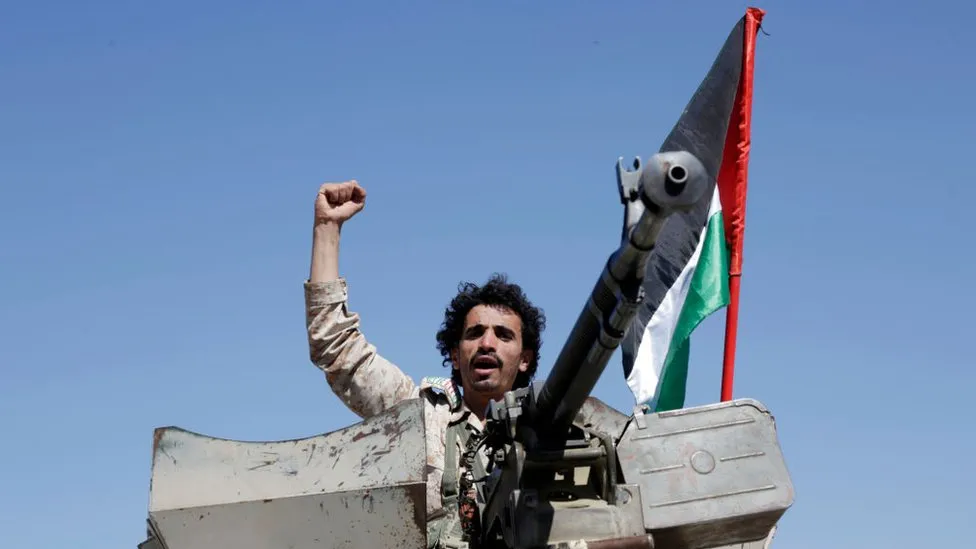
Houthi Red Sea attacks: Group says it struck US container ship
The Houthi group in Yemen claims they have hit a US merchant ship called KOI in the Red Sea in a new attack on commercial ships.
But two sources who work at sea told the media to Verify that the Houthi claim was not true. US and UK authorities have not said if an attack happened.
Security company Ambrey said a ship near Yemen’s southern coast had an explosion on its right side, but they did not say which ship it was.
At the same time, the US started more air attacks in Yemen.
Ten flying machines called drones were going to be sent into the air, but somebody tried to attack them before they could take off.
Reuters news agency says that the KOI is a container ship from Liberia. It is operated by a company in the UK called Oceonix Services. The company owns a ship called Marlin Luanda, which was hit by a missile and got damaged on Saturday.
The Houthis think it’s okay to attack Israeli, US and British ships because of things these countries have done in the past. The US and Britain say they are attacking Houthi missile positions to protect their trade.
Houthi military spokesperson Yahya Sarea said on Wednesday that their armed forces attacked an American ship named KOI with some naval missiles.
He said the ship was going to the ports of a place called “occupied Palestine”, which is another name for Israel.
The industry publication Trade Winds said that the claim was not true. Instead, a crew member who was sick was taken off the ship for medical help.
Two people who work in maritime security agreed with this opinion. UK Maritime Trade Operations (UKMTO) has not sent any alerts about the attacks.
But Mr Sarea said again that the Houthis would not hesitate to fight back against any increased actions from Britain and America.
“The Yemeni Armed Forces consider all American and British ships in the Red and Arabian Seas as targets as long as the American-British aggression against our country continues,” said the Houthi spokesman.
The US Central Command said that 10 drones in Yemen were getting ready to be launched and they were a danger to ships and US warships in that area.
It said that all 10 were destroyed, including a Houthi drone control station on the ground.
The US said one of its boats destroyed three Iranian drones and a missile from the Houthi group in the Gulf of Aden.
Houthi attacks on ships in the Red Sea are making it harder to trade internationally. People are worried this will cause problems with getting supplies where they need to go.
On 7 October, many gunmen from Gaza went into southern Israel and killed about 1,300 people, mostly civilians, and took 250 others as hostages.
Israel started a war in Gaza and more than 26,900 people, mostly women and children, have died. This information comes from the health ministry in Gaza, which is controlled by the Hamas group. -
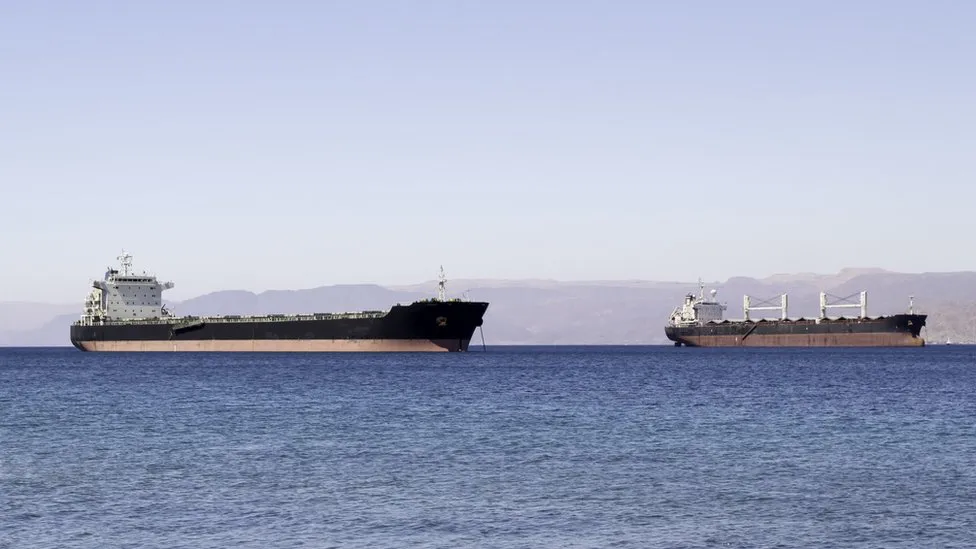
Greek ship struck by missile in the Red Sea – Report
A ship from Malta with a Greek owner was hit by a missile in the Red Sea near Yemen, according to Ambrey, a company that provides security for ships.
It is believed to be the third time the big ship named Zografia has been involved in something bad in the last day.
On Tuesday, the US military said they stopped weapons from Iran that were meant for the Houthis.
At the same time, the US has attacked more places in areas of Yemen controlled by the Houthi group.
An American official told CBS, which works with the BBC, that the US did more attacks on Houthi positions last night.
The US and UK bombed many Houthi targets on 11 January after the Houthi group attacked ships in the Red Sea.
We still don’t know what was targeted in the recent US operation.
The Houthis promised to fight back, and the US said it stopped a missile from hitting one of its ships that was launched from a Houthi- controlled area in Yemen.
The fighters of the movement have attacked several ships in protest against Israel’s war with Hamas since November.
However, many people do not have any ties to Israel.
The Red Sea connects the Indian Ocean to the Mediterranean through the Suez Canal, but some shipping companies are now taking a longer route around the Cape of Good Hope to reach Europe instead.
On Tuesday, the US announced that the weapons they found on a ship near Yemen were similar to the ones the Houthis used in their attacks in the Red Sea.
The robbery happened on January 11th near the coast of Somalia, which was the same day as the first US-UK airstrikes.
Missile parts and defense equipment were found on a ship.
US Central Command said they have captured the first shipment of dangerous, Iranian-made weapons to the Houthis since the attacks on ships began in November 2023.
The search is still going on for two Navy Seals who fell overboard during the mission.
Media said that an officer fell off the ship because of big waves, and another officer jumped in to help, as they are supposed to do. -
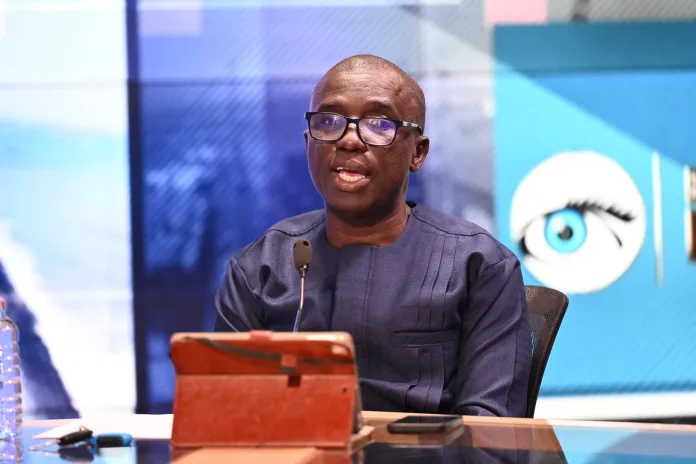
Ghana cedi to stabilise in 2024 – Trade expert predicts
Lingering misfortunes from the early 2020s have cast a shadow on anticipations for 2024, with a lot of people predicting continued economic hardship in the new year of 2024.
As the new year unfolds, a mere two weeks in, the conflict in the Gaza Strip has rapidly intensified to unprecedented levels, evoking a sense of impending doom among keen observers.
Yemeni armed rebels have targeted commercial sea-going vessels along the Red Sea route, resulting in fatal attacks that have sparked significant concern among both business professionals and ordinary consumers.
While the economic impact on Ghana remains unquantified, experts, drawing parallels from similar incidents in recent years, caution against expecting a positive outcome.
Nonetheless, trade expert and West Africa Director for CUTS International, Accra, Appiah Kusi Adomako has expressed some optimism for 2024 as far as the economic outlook of Ghana is concerned, in light of global happenings.
Reviewing the year 2023 and prospecting for 2024 on the Eye on Port TV programme, Mr. Adomako predicted relative stability for the cedi in the new year.
He said with the United States Federal Reserve reportedly likely to cut interest rates, investors will redirect funds to emerging economies like Ghana. This, according to him, will have a positive effect on the cedi’s value.
“In 2022, the cedi was stable until the US decided to increase its interest rates; so, people were moving all their investments from emerging economies and Ghana was suffering a lot, because every day investors were withdrawing their investments from Ghana. And whenever they withdraw their investment and convert to dollars, there’s a lot of pressure on the cedi. This year, we expect government to reduce the interest rate; and most likely we are going to have a lot of dollars coming into emerging economies, and Ghana could benefit.”
He added that Ghana is meeting its external creditors for an Extended Credit Facility programme, “and we hope that once they are able to agree on a good deal for us, we will end up getting the US$600million. In fact, the president said we hope to get US$1.6million by end of May”.
However, all won’t be rosy in 2024 according to the West Africa Director-CUTS International Accra, who calls for a sense of caution and preparation in 2024.
He says while it is fair to acknowledge the effects of global events like COVID-19, the war in Ukraine among others on the local economy, government is not absolved from blame.
Mr. Adomako urged government to strategically introduce policies such as import restrictions in proportion to the local capacity to produce.
He said proper planning and accountability can have a mitigating effect on the impacts from global shocks on the economy.
According to Mr. Adomako, Russia has shown no sign of withdrawing from the war in Ukraine, and the potential regionalisation of the Israeli-Palestine war may require economic resilience from governments around the world.
He urged government to be circumspect in its expenditure during 2024, especially as the country prepares to head to the polls in December.
He said government must abide by the Fiscal Responsibility Act in order not to return the state into an economic quagmire in 2024.
-
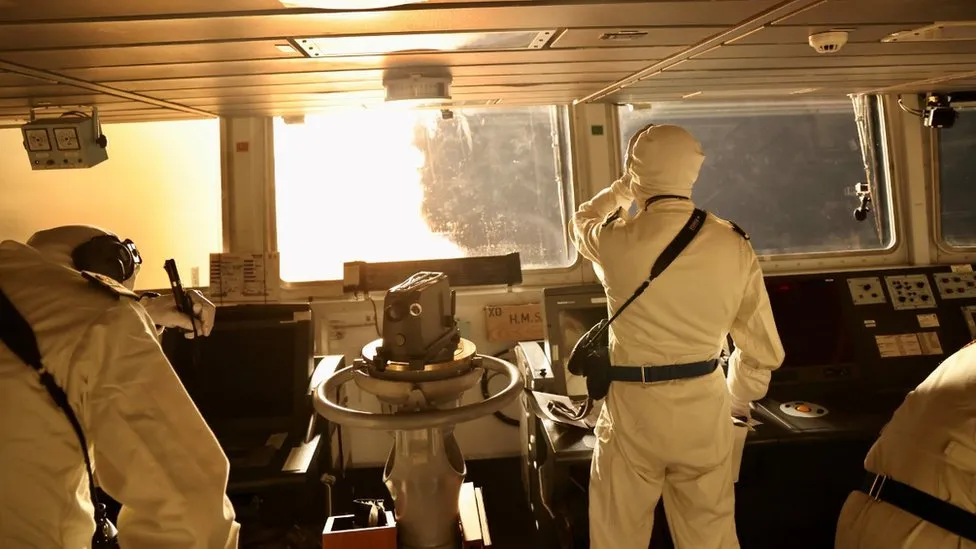
USA and UK thwart biggest Houthi attack in the Red Sea
Navies from the UK and US stopped a big attack by Yemen’s Houthi rebels on ships in the Red Sea, according to the UK defence secretary.
The US military said that a group supported by Iran sent out 18 drones and three missiles on Tuesday night.
They were attacked and shot by jets from carriers and warships. No one got hurt or things broken.
The Houthis have not said anything, but they have attacked merchant ships because of the fighting in the Gaza Strip.
They have said, sometimes not true, that the ships were connected to Israel.
Houthis are not listening after being told not to attack the Red Sea.
What does attacks in the Red Sea mean for world trade.
The US military said that there have been 26 attacks since November 19th.
The US, UK, Germany, Italy, Australia, Japan and 10 other countries are telling the Houthis to stop their attacks right away. They say the attacks are against the law and are a danger to ships passing through the important waterway, where 15% of the world’s trade goes through.
The allies have chosen not to attack areas in rebel-held north-west Yemen in response. However, the UK Defence Secretary Grant Shapps has warned that if the attacks keep happening, the Houthis will face the consequences.
“We will do what’s necessary to keep innocent people safe and protect the world’s economy,” he said. -
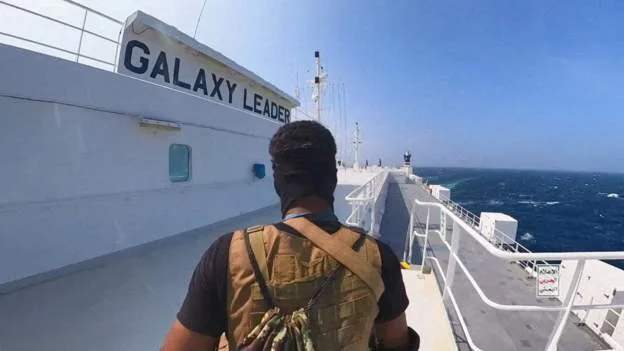
Transport behemoth claims Red Sea route still too risky
One of the world’s largest shipping companies, Germany’s Hapag-Lloyd, told the media it would avoid the Red Sea for at least another week and then reassess the situation following recent attacks by Houthi rebels in Yemen.
Iran-backed rebels, who have declared their support for Hamas, are targeting ships using the popular Suez Canal shipping route.
The group has previously claimed its attacks target ships linked to Israel, in response to the war in Gaza. Shipping companies are worried about the safety of their employees as some ships have been attacked by drones and missiles.
The US Navy destroyed three Houthi “small boats” over the weekend as their crew tried to board a container ship in the Red Sea.
Hapag-Lloyd sends 50 ships through the Suez Canal each month and will have to reroute around the Cape of Good Hope, which will add a week or two to journey time depending on the destination.
-
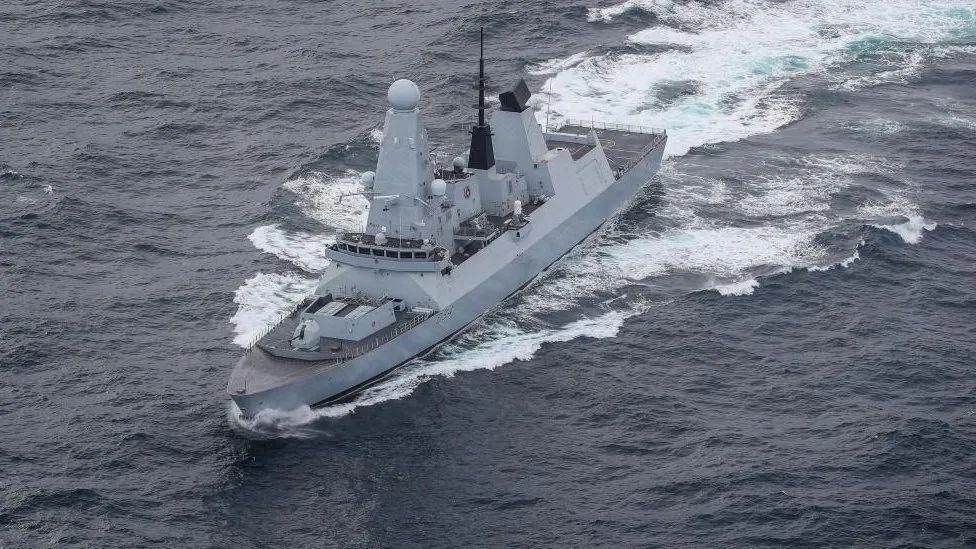
UK claims to fend off Houthi strikes in Red Sea
Defense Secretary Grant Shapps said British forces are ready to take action against Houthi rebels targeting cargo ships in the Red Sea.
In an article, he said Britain was “ready to take direct action” to protect this important shipping route.
Highlighting how a British warship shot down a suspected drone attack in the Red Sea in December, Mr Shapps said “we will not hesitate to take further action”.
Houthi forces have targeted foreign ships since the start of the war between Israel and Hamas.
The Iran-backed rebel group has declared support for Hamas and said it targeted ships bound for Israel, carrying out more than 100 drone and missile attacks.
US and British warships shot down these missiles and drones at great cost, but are now warning the Houthis to stop or risk military retaliation. In his article for the Daily Telegraph, Mr Shapps wrote: “The Houthis should make no mistake: we are committed to holding bad actors accountable for their illegal arrests and attacks.
“Continued aggression in the Red Sea risks leading to miscalculation and escalation that could trigger a regional conflict,” he added.
If the Red Sea is not protected, he wrote, “it risks emboldening those who seek to intimidate elsewhere, especially in the South China Sea and Crimea.
” Mr Shapps said the situation was “a test for the international community” and the UK must “stand strong alongside our allies”. The United States launched an international naval operation in December to protect shipping in the region.
Countries including the UK, Canada, France, Bahrain, Norway and Spain have participated.
As part of this coalition, HMS Diamond – a British Type 45 destroyer – shot down a suspected attack drone that month. The Ministry of Defense said it was the first time in decades that the Royal Navy had fired at an aerial target in anger.
On Sunday, the US Navy announced that it had destroyed Houthi “small boats” whose crews were trying to board a container ship in the Red Sea.
Helicopters from nearby US warships responded to the call for help and, after being attacked, sank three boats “in self-defense”. The crew died and the fourth boat fled the scene.
The problem for the US, UK and their allies is that targeting Houthi missile launch sites would seriously escalate the current crisis in the Middle East, potentially pushing the West and Iran into a direct confrontation.
It will also represent the West – as perceived by the Arab world – in entering the conflict in Gaza on the side of Israel.
The Red Sea is one of the most important shipping routes in the world because it connects markets in Europe and Asia.
About 12% of global trade passes through the Bab El Mandeb Strait, near where the Houthis are targeting.
Analysts warn that Houthi attacks could lead to higher prices, as it is also one of the most important routes for the transport of oil and liquefied natural gas produced in the Middle East .
-
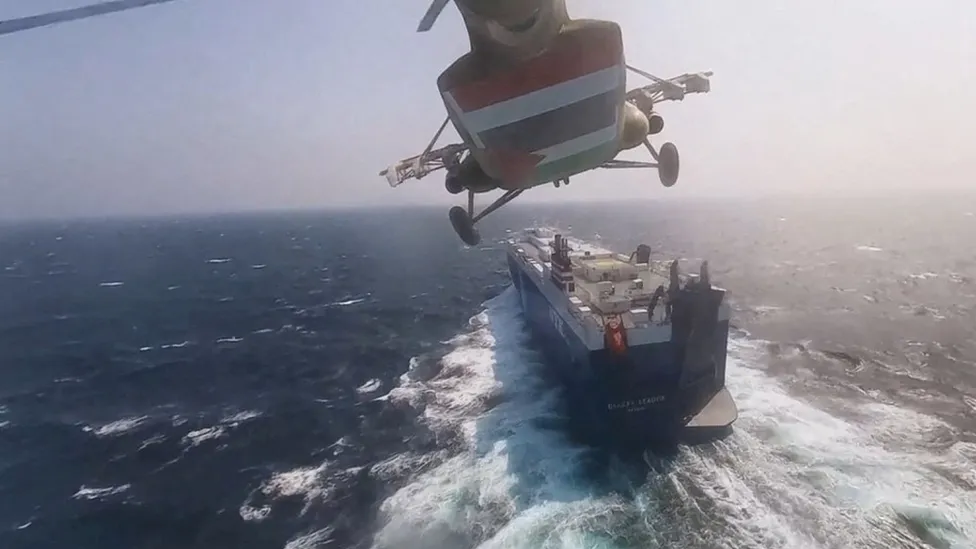
How do Red Sea assaults affect global trade?
The stability of global supply chains is under threat as the world’s leading shipping companies are rerouting their vessels away from the Red Sea, in response to increasing attacks by Houthi rebels in Yemen.
These attacks have led to a significant shift in maritime traffic, avoiding one of the most crucial and busiest shipping lanes globally.
The Houthis, showing solidarity with Hamas, have targeted ships they claim are bound for Israel, although the destinations of all the attacked ships remain unconfirmed.
Recent Developments: The intensification of these assaults began with the onset of the Israel-Hamas conflict in October.
The Houthi group, supported by Iran, has been employing drones and missiles to attack international ships passing through the Bab al-Mandab Strait.
This narrow waterway, only 20 miles wide, lies between Eritrea and Djibouti in Africa and Yemen on the Arabian Peninsula, serving as a pivotal route for ships heading north towards Egypt’s Suez Canal.
In an attempt to mitigate the risk of further attacks, major shipping companies like Mediterranean Shipping Company and Maersk have now chosen to take a longer, alternative route.
This detour navigates around the Cape of Good Hope at the southern tip of Africa, then proceeds up the continent’s west coast, significantly extending travel times and potentially impacting global supply chains.
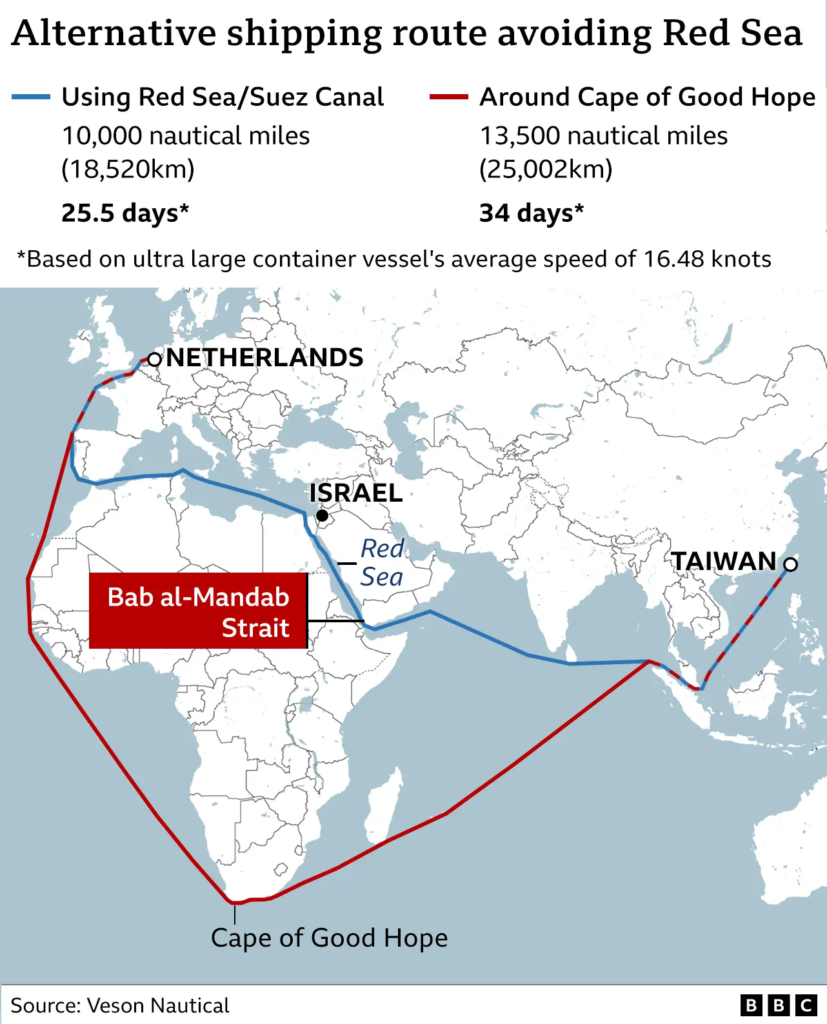
BP has also paused all shipments of oil through the Red Sea, blaming the “deteriorating security situation”.
The longer journeys will add at least 10 days shipping times and cost companies millions of dollars.
Why is this shipping route so important?
Any ship passing through the Suez Canal to or from the Indian Ocean has to come via the strait of Bab al-Mandab and the Red Sea.
The Suez Canal is the quickest sea route between Asia and Europe and is particularly important in the transportation of oil and liquefied natural gas (LNG).
About nine million barrels of oil per day were shipped through the Suez Canal in the first half of 2023, according to freight analytics firm Vortexa.
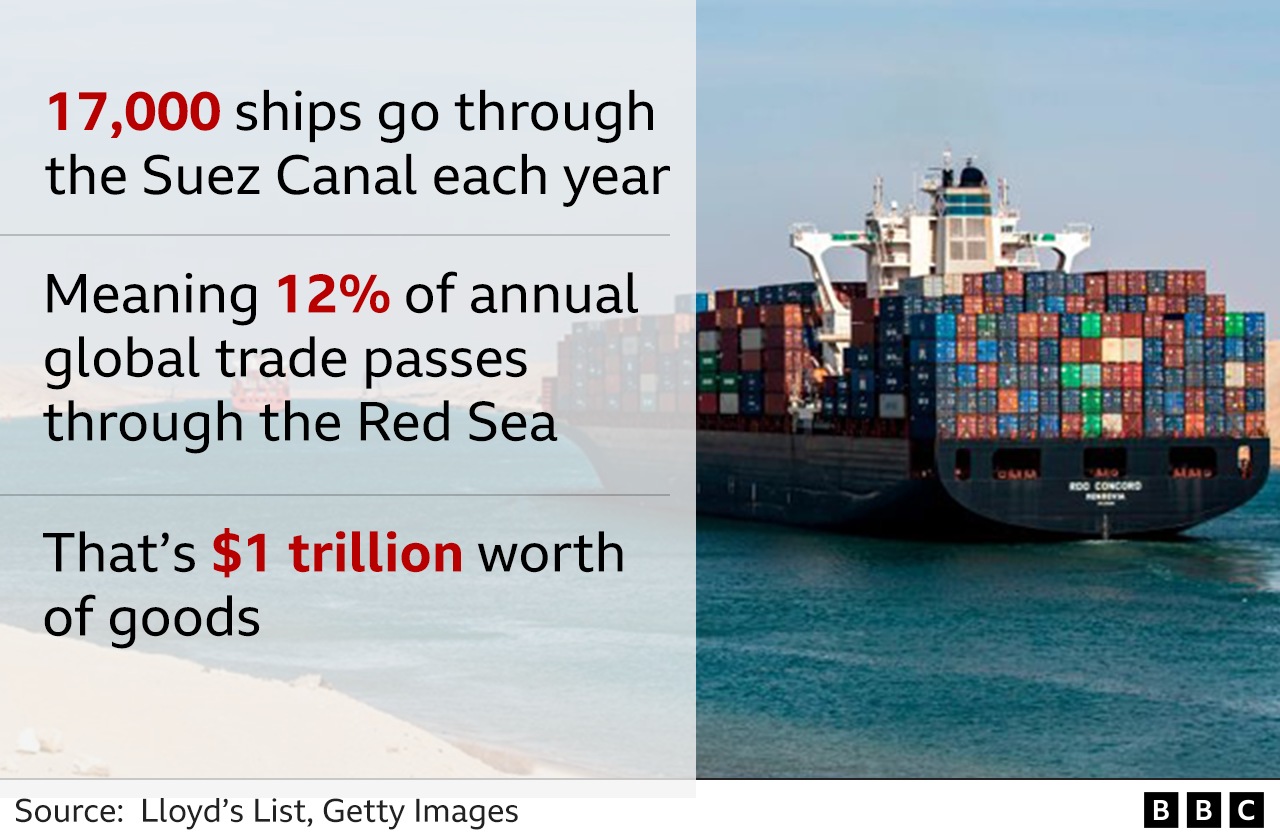
Analysts at S&P Global Market Intelligence said nearly 15% of goods imported into Europe, the Middle East and North Africa were shipped from Asia and the Gulf by sea. That includes 21.5% of refined oil and more than 13% of crude oil.
But it is not just about oil. Container ships carry all sorts of consumer goods seen in the shops including TVs, clothes, trainers and sports equipment.
What is the impact on consumers?
It is inevitable that supply chains will be affected due to ships being diverted away from the Red Sea, but consumer goods “will face the largest impact”, according to Chris Rogers, head of supply chain research at S&P Global Market Intelligence, though he does note the current disruption has occurred “during the off-peak shipping season”.
Delays to products reaching shops can be expected, with container ship journeys expected to take at least 10 days longer due to the Cape of Good Hope route adding about 3,500 nautical miles.
The extra distance will also cost companies more. Shipping rates have risen 4% in the past week and those costs could be passed on by businesses to customers.
However, rates still remain much lower than last year, and are far below the levels seen in 2021, when freight charges soared in line with demand as Covid restrictions were eased.
There are also fears the disruption could push up oil prices.
A rise in oil prices, a key ingredient in car fuel, can lead to higher prices at the pumps and also drive higher inflation. Inflation, which measures the pace of price rises, has been falling in the UK and is currently 4.6%.
When it comes to shipments of LNG being disrupted, even if wholesale energy prices rise, any increases would not feed through to domestic bills until April 2024 at the earliest.
This is because the energy price cap, which limits the amount suppliers can charge, has already been set for January.
Is moving freight by sea the only option? Mr Rogers says transporting goods by rail instead would require “crossing Russia”, which is under economic sanctions due to invading Ukraine, while “trucking from the Gulf to Israel may only offset around 3% of shipping”.
What is being done in response?
The attacks have led the US to launch an international naval operation to protect ships in the Red Sea route, and countries including the UK, Canada, France, Bahrain, Norway and Spain have joined.
US defence secretary Lloyd Austin held a virtual meeting with ministers from more than 40 countries on Tuesday, and called on more nations to contribute to efforts to keep shipping safe in the region.
But some shipping companies are reluctant to immediately start using the route again despite increased security.
Maersk and Hapag-Lloyd, which have both have ships that have been attacked by Houthi rebels, welcomed the extra measures but said it is difficult to determine when they would go back to using the Red Sea, meaning there could be disruption for some time.
-
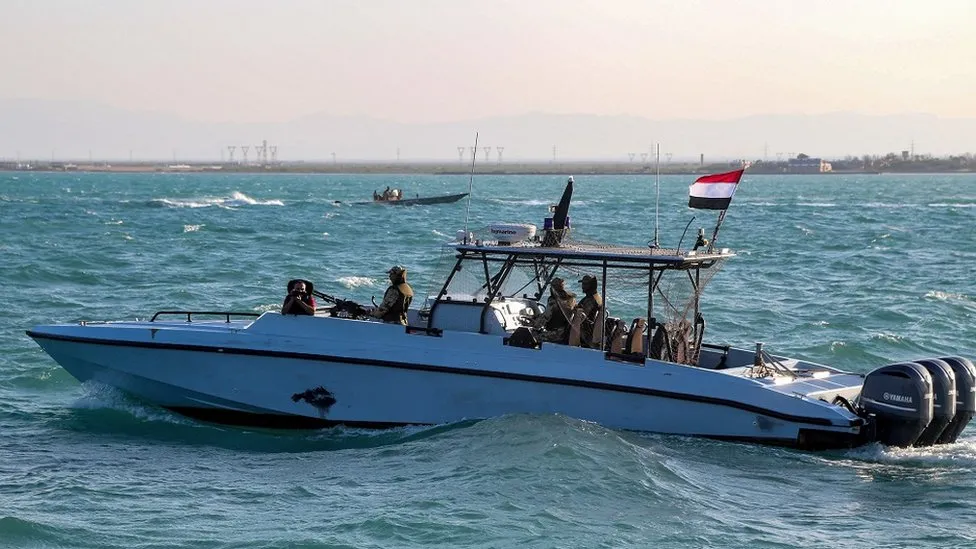
Drones and missiles fired from Yemen strike cargo ships in Red Sea
The United States says that two cargo ships in the Red Sea were attacked by missiles from Yemen.
One person was attacked by a drone and another by missiles from a region in Yemen controlled by the Houthis, a rebel group supported by Iran.
They were attacked in a narrow strait of water called Bab El Mandab, which is very important for world trade.
There was another attack on foreign ships in the area during the Israel-Hamas war.
The Houthis, who took control nine years ago, have said they back Hamas and are attacking ships heading to Israel.
A person from the US military said that they know something from an area in Yemen controlled by Houthi rebels hit a ship and caused damage, and there was also a fire reported.
The large ship, named Al Jasrah, is owned by a German company called Hapag-Lloyd and registered in Liberia.
A Hapag-Lloyd spokesperson told AFP that the ship was traveling to Singapore from a port in Greece called Piraeus. No one got hurt and the ship is moving towards where it needs to go.
Second boat was attacked.
On Friday, a US defense official said a ballistic missile hit another ship flying the flag of Liberia in the Bab El Mandab. The missile started a fire and a US Navy ship was on the way to stop it.
Israel wants the US to take action against the attacks, but the US is worried that doing so could make the situation with Israel and Hamas worse and lead to Iran fighting back.
Instead, there would probably be a group of different countries’ ships working together to protect ships and take down any missiles or drones that come their way.
US national security adviser Jake Sullivan, who is visiting the Middle East, said the Houthis are a big threat to shipping and trade in the area.
He said Iran is mostly to blame for the attacks. He said that even though the Houthis are carrying out the attacks, Iran is the one giving them the weapons to do it.
“Iran needs to stop these attacks on its own because they are a big problem for international law and peace. ”
More things happened in the area on Friday. There was a report about another ship being taken over in a different place.
The UK’s maritime trade agency got a report that a ship’s crew lost control of the ship and it’s now going towards Somalia in the Arabian Sea.
“At the moment, the UKMTO said that all crew members are safe. ”
On Friday, Ambrey, a company that protects ships at sea, said that a ship called MSC ALANYA, registered in Liberia, was approached by a small boat with Houthi members who told the ship to go in a different direction.
No one has admitted to causing the incidents.
The recent attacks are happening after a few attacks in the southern Red Sea. This is making insurance more expensive for ships and some might have to take a longer route around South Africa to avoid the Red Sea.
The Houthis are in a war with the government of Yemen that is supported by Saudi Arabia. They say they are part of a group of countries that oppose Israel, the US, and the West, and are connected to Iran.
This month, they attacked many commercial ships. A US warship had to step in. In November, they stole a cargo ship.
Warships from the US, France, and Britain are watching over the Red Sea and have used missiles to shoot down several flying objects.
The Bab El Mandeb Strait is a 20-mile wide pathway that divides Eritrea and Djibouti from Yemen.
Around 17,000 boats and 10% of all the world’s trading pass through it each year. Every ship that goes to or from the Indian Ocean has to pass through the Suez Canal. -

Red Sea resort to house Israeli evacuees
Reports from Israeli media indicates that, the city of Eilat in southern Israel is thinking about creating a temporary area with tents to accommodate the many people who have relocated there since the war began.
The mayor of Eilat, which is a vacation spot on the Red Sea, stated that the number of people living in the city has doubled because more than 60,000 individuals who had to leave their homes arrived there.
Until now, they have stayed in 12,000 hotel rooms, 4,000 privately rented places, and special hospitality centers.
Mayor Eli Lankri said that we are considering different options, which may even include setting up a tent city.
We have finished the plans we made last week and we will show them to the people who make the decisions.
The Israeli government says that over 200,000 Israelis have had to leave their homes because of the attack on October 7th. They are leaving because they live near the border with Gaza and Lebanon. -

Eritrea reacts to contentious remarks made by Abiy about Red Sea
Officials in Eritrea stated that they will not engage in discussions about Ethiopia’s use of the Red Sea after some questionable remarks made by Addis Ababa.
During his speech to lawmakers, Ethiopia’s Prime Minister Abiy Ahmed explained that having access to the Red Sea is extremely important for the survival of his country.
Mr Abiy said that the Red Sea and the Nile River are really important for Ethiopia and can either help it grow or destroy it. Some people think that what he said might lead to problems with Eritrea.
Ethiopia became the biggest landlocked country in Africa when Eritrea separated from it in 1993. Since then, it has relied on the small country of Djibouti for more than 85% of the things it brings in and sends out.
Ethiopia said some time ago that it wanted to build its navy again. Abiy mentioned that ports in Eritrea, Djibouti, and Somaliland are places where we can peacefully acquire facilities.
A short message from Eritrea’s Ministry of Information on Monday said that recent discussions about access to the sea and related topics were too much. It said that the issue has confused everyone who is paying attention.
Eritrea helped the government of Addis Ababa during a very violent war in the Ethiopian region of Tigray.
Prime Minister Abiy collaborated with Eritrean leader Isias Afeworki in 2018 to bring an end to a long and difficult 20-year war between their countries.